Get things under control with the help of two experts
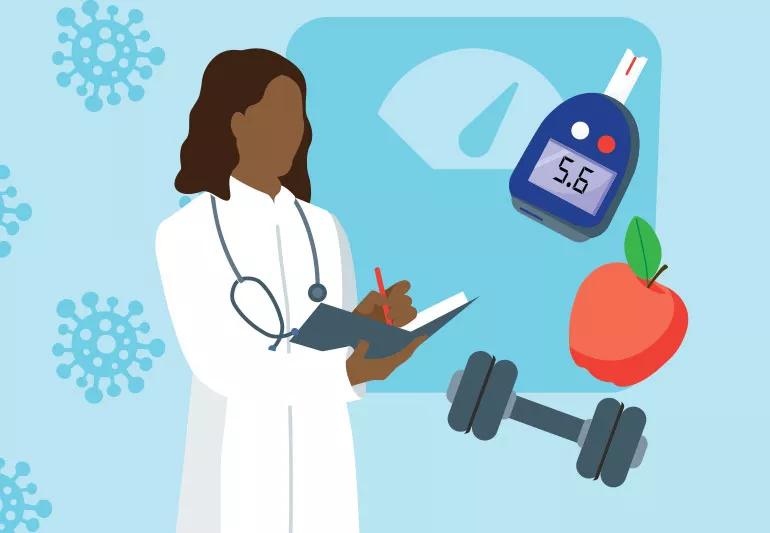
Besides the spread of the virus itself, one of the biggest concerns about the ongoing COVID-19 pandemic has been keeping track of the pre-existing conditions that carry increased risks for severe illness or even death.
Cleveland Clinic is a non-profit academic medical center. Advertising on our site helps support our mission. We do not endorse non-Cleveland Clinic products or services. Policy
Obesity, particularly severe obesity, is on the list. Multiple studies have shown that having a body mass index (BMI) of 30 or higher increases the risk of severe illness connected with COVID-19, something the U.S. Centers for Disease and Control Prevention (CDC) has also emphasized.
Ali Aminian, MD, Director of the Bariatric & Metabolic Institute at Cleveland Clinic, echoes these findings. “We have learned that obesity is a risk factor for the severe form of COVID-19, which includes hospital admission, need for intensive care, ventilator support and increased mortality.”
The exact reasons why people with obesity are so adversely affected by COVID-19 is still unknown, but Dr. Aminian has a few suggested explanations.
People who have obesity (and associated risk factors like diabetes) often suffer from weakened innate and adaptive immunity, making them more susceptible to infections.
Obesity is a chronic inflammatory state that causes your body to produce excessive amounts of cytokine, molecules that communicate and regulate your immune system. COVID-19 infections also trigger the release of cytokines. When combined with obesity, this can lead to an excess amount of cytokine in your body, called a “cytokine storm,” that can cause damage to multiple body organs. “This,” Dr. Aminian says, “could explain why people with obesity experience such severe response with COVID-19.”
Those who are living with obesity frequently have underlying cardiovascular disease, and that comes with an array of associated risks like diabetes and hypertension. These factors can all contribute to difficulties stemming from a COVID-19 infection.
People who have overweight or obesity are already at a higher risk of blood clots, a condition that’s also been associated with COVID-19. “COVID-19 damages the endothelium (the cellular lining of blood vessels),” says Dr. Aminian. “Autopsies have shown that blood clots and widespread severe endothelial damage are two of the causes of increased mortality in many patients who contract COVID-19.”
Obesity is known to impact the mechanics of both the chest wall and diaphragm, as well as make people more vulnerable to other lung conditions like sleep apnea, asthma and obesity hypoventilation syndrome. These can all become worse due to the known lung issues that come with COVID-19 infections.
Due to these potential risks, Dr. Aminian stresses the importance of people with obesity taking precautions to protect themselves from COVID-19. “Because people with obesity are so vulnerable to infection from COVID-19, it’s extremely important they follow public health guidelines like wearing a mask, social distancing and getting vaccinated.”
According to the American Diabetes Association, there isn’t enough data to show that people who’re living with Type 1 or Type 2 diabetes are more likely to get COVID-19. However, diabetes can create worse complications should a person also become infected with COVID-19. And if you are living with additional health conditions like obesity or heart disease, that can also increase your risk of experiencing serious complications.
“The problems with diabetes are mainly related to high blood sugar levels,” says endocrinologist and obesity specialist Marcio Griebeler, MD.
“If you have high blood sugar levels for a long time, you’re going to be prone to infections — eyes, heart, kidneys, nerves — in all of those things. If you have well-controlled diabetes, you decrease the risk of having complications from COVID-19. So yes, if you have diabetes, you are at an increased risk. But if you have well-controlled diabetes, you are in a much better position,” he explains. Vaccination can also help protect you from severe infection.
Dr. Griebeler says this might have been the case earlier on in the pandemic when we were stuck at home and hesitant to go places. Now, healthcare providers know what to do to keep people safe. And with safety precautions being enforced and virtual visits in place, it’s much easier to access care.
So, what have been the biggest barriers? He says stress and struggles with mental health.
“Stress levels now are very, very high and that’s a big problem because stress affects everything else,” notes Dr. Griebeler.
“When you’re stressed, it changes your lifestyle. You might not eat as healthy as you were before. You also might not exercise. So, one of the priorities that I have when I am working with people who are living with diabetes or obesity is helping them navigate management during difficult times.”
Dr. Griebeler is currently taking part in a clinical trial that’s designed to help people manage their weight and diabetes better. The study takes a closer look at factors like diet, exercise, appetite control, mental health, stress and sleep disorders that may be playing a role in weight gain. This study also uses an approach focusing on weight loss for treatment of diabetes. People in the study will receive medications for diabetes and obesity that will help them lose weight.
Participants are selected from Cleveland Clinic’s Employee Health Plan and the requirements are a BMI greater than or equal to 30 and a diagnosis of Type 2 diabetes. They’re then randomized and placed in one of three programs. One is a shared medical appointment program with a prescription for a weight loss medication. The second is a shared medical appointment program without a prescription for weight loss medication, and the third is a one-on-one visit every three months with an endocrinologist. All will qualify to receive medications for diabetes that help people lose weight.
Dr. Griebeler says that so far, study participants are doing an amazing job and he hopes that more people will take part.
Not always. Unlike Type 1 diabetes, there’s a genetic component to Type 2 diabetes. So, diabetes and obesity don’t always go hand and hand.
“Not everyone who has obesity will have Type 2 diabetes, but the majority of people who are living with Type 2 diabetes will have obesity. This relationship has become known as ‘diabesity.’ So tackling obesity and managing diabetes is very helpful,” explains Dr. Griebeler.
Most of us know by now that diet and exercise are important when it comes to managing our health. However, Dr. Griebeler says that many people tend to forget about the importance of a good night’s sleep.
“It is important is to sleep well because if you don’t sleep well or if you have sleep apnea, your body is going to release hormones that aren’t beneficial, like cortisol. This can increase your blood sugar and make you tired and less motivated to do things during the day. So, people need to sleep well,” he says.
As mentioned, when you’re stressed out, you can get thrown off track. And that stress can take a toll on your body by driving up your blood pressure and blood sugar. Instead of allowing yourself to be consumed by stress, find good ways to cope. Laugh, go walking, meditate or do something that brings you joy. And if you find that isn’t enough, it never hurts to talk to a mental health professional.
While there’s nothing wrong with walking, Dr. Griebeler says that when you’re managing obesity, diabetes or both, resistance training also offers great benefits.
“People don’t realize that building muscle mass, meaning weight training and things like that, will increase your metabolic rate and make you burn more calories. Walking is fine. You will burn some calories. But try adding resistance or weight training. It makes a huge difference,” he suggests.
To be successful with your nutritional goals, drop the mentality that you have to diet to lose weight.
“I like to move away from using the word ‘diet’ because it implies restriction. Instead, learn how to eat and learn about how the body will behave based on how you eat. Also, being hungry is not the goal. Eating foods that make you full longer is key,” says Dr. Griebeler.
We know. A high-sugar diet can lead to obesity — and obesity can increase the risk of high blood pressure, diabetes and high cholesterol. We also know to watch out for the usual suspects like desserts, soda and processed foods. But Dr. Griebeler says that people often overlook fruit and fruit juice.
“People think fruit or fruit juices will be healthy. But actually, some have a lot of sugar in them. So, it’s good to understand what is healthy and what is not healthy because some fruits can be tough for patients with diabetes if their sugar content is high.”
If you’ve tried to manage your weight or diabetes but nothing seems to be working, reach out to your healthcare provider. They can help you develop a plan or steer you in the direction of a weight management specialist or endocrinologist. If you’re having trouble because of finances or other hardships, Dr. Griebeler says don’t be afraid to ask those around you for help.
“You shouldn’t be afraid to ask for help. Ask for help from your family, your friends or even community organizations. With the pandemic, it’s so important to seek help. And there are many community organizations out there that can help you get on the right track.”
Learn more about our editorial process.

Having overweight and disordered eating is a high-risk combination that often gets dismissed or overlooked

There are better breakfast options, but if it’s got to be cereal, look for whole grains, high fiber and no added sugar
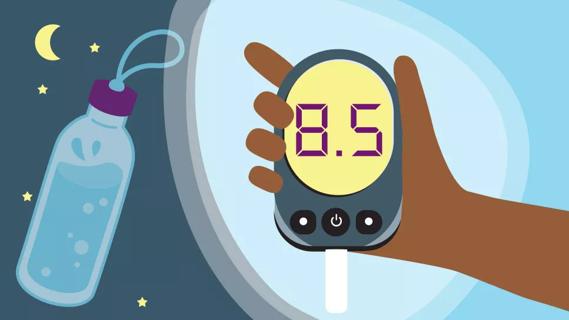
Planning ahead, checking in with your care team and being vigilant about blood sugar monitoring can help ensure a safe fast
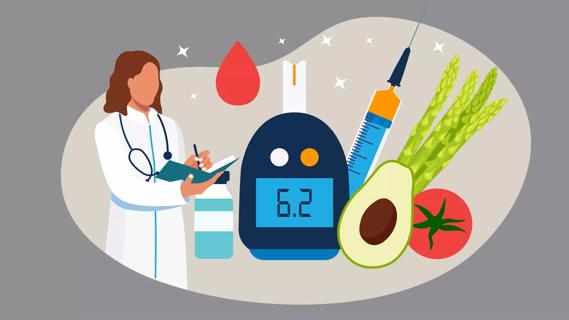
A diabetes diagnosis, new or long-standing, can trigger reactions like grief, stress, depression and frustration, but symptom relief and help are available

Type 1 diabetes happens when your body doesn’t make insulin, while Type 2 happens when your body can’t use insulin properly
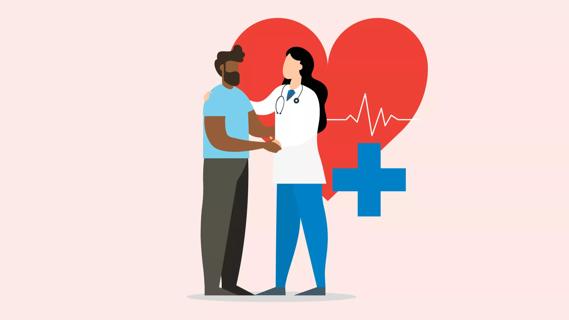
Having underweight, having overweight and having obesity can be dangerous for your heart
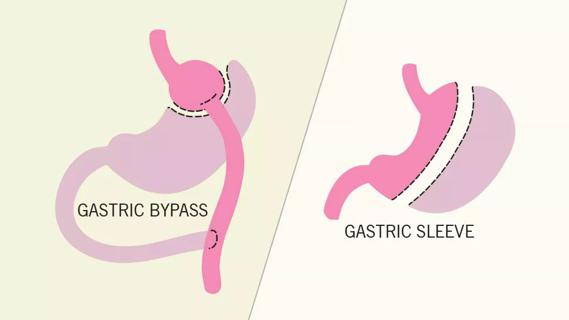
Gastric bypass and sleeve gastrectomy are different procedures that offer similar benefits, including significant weight loss

There is an indirect link between the sweet substance and the condition

Your metabolism may torch 1,300 to 2,000 calories daily with no activity

A gentle touch in all the right places may help drain your sinuses